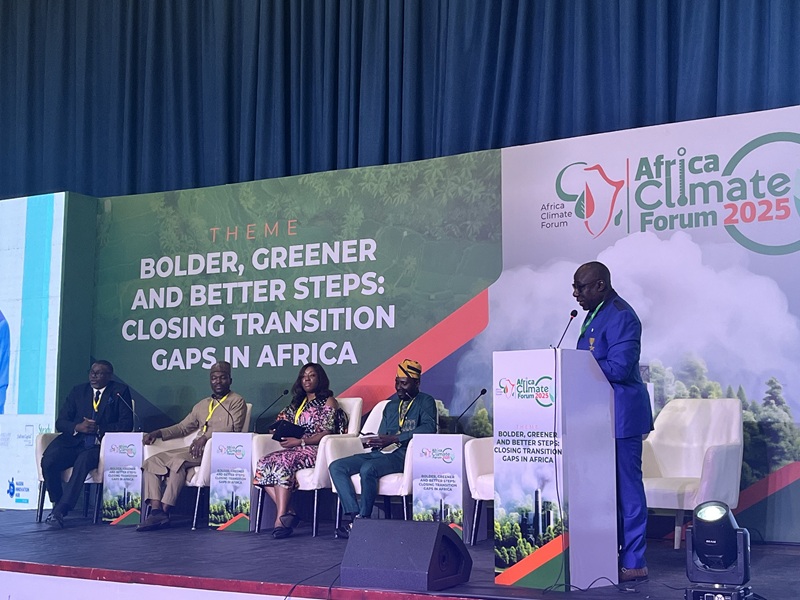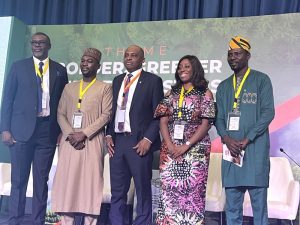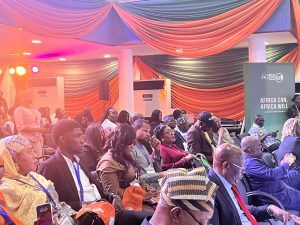
Written by: Mariam Idris
The Africa Climate Forum (ACF) 2025, held at the Shehu Musa Yar’adua Centre Wuse, Abuja, convened a powerful assembly of policymakers, financiers, researchers, and civil society actors under the compelling theme, “Bolder, Greener and Better Steps: Closing Transition Gaps in Africa.”
With a clear focus on action over promises, the forum emerged as a landmark event aimed at shaping Africa’s climate future through policy, innovation, and strategic partnerships.
A key highlight was the panel session on “Taking Stock of Climate Action in Africa,” which explored progress, setbacks, and the continent’s readiness to scale its climate commitments.
The message was resounding: Africa’s transition must be equitable, ambitious, and anchored in shared responsibility.
Setting the tone, Professor George Nwangwu convener of the Africa Climate Forum and Director General Global Centre for Law, Business and Economy, delivered a stirring goodwill message, acknowledging key dignitaries and reiterating the urgency of the climate crisis.
He praised the ACF for becoming a beacon of hope and innovation in the face of mounting environmental threats. “The urgency of climate action has never been greater,” he said, noting the upcoming COP30 summit and the finalized rules under Article 6.0 of the Paris Agreement.
He emphasized the growing momentum toward global climate finance, citing the pledged $300 billion annually by developed nations to support developing countries. Still, he warned that systemic gaps remain across Africa, from weak governance frameworks to limited energy access and underfunded adaptation plans.

ACF 2025 was positioned not just as another forum but as a bold call to action. Addressing cross-cutting issues governance, finance, energy access, and human rights the forum challenged participants to move beyond rhetoric. Bridging Africa’s transition gaps, the forum stressed, requires innovative financing tools, stronger public-private collaboration, and holding global leaders accountable.
In particular, the forum spotlighted the continent’s urgent energy access gap, which demands over $100 billion annually to meet rising industrial and domestic needs. As fossil fuel use declines globally, speakers underscored the need to correct current energy injustices and ensure that Africa’s development is not sacrificed in the name of transition.
Speaking at the event, Mr. Abu Stepen, the National Network Coordinator (NNC) delivered a powerful message on Taking Stock of Climate Action in Africa. In his remarks, the NNC emphasized the importance of developing effective metrics ahead of COP30 to track and measure climate progress across the continent.
He stressed that Africa must move from commitments to concrete actions, ensuring that all relevant government institutions are fully integrated in the processes of climate planning and budgeting.
He further underscored the urgency to scale up capacity-building systems that will enable African nations to access climate finance more effectively. Building institutional readiness, strengthening local expertise, and improving financial frameworks are essential steps toward unlocking global and regional funds to drive national and subnational climate initiatives.

The NNC called for stronger data analysis, monitoring, and evaluation frameworks to accurately assess progress in climate interventions.
He also advocated for strategic coalitions and partnerships across sectors and regions to amplify Africa’s voice and strengthen its collective position in global climate negotiations.
The message was clear collaboration, data-driven decision-making, and strong institutional alignment are key to accelerating Africa’s climate action journey.
As Africa positions itself for COP30, ACF 2025 set the stage for a more unified and assertive African voice in the global climate discourse.
Despite the volatility of the climate policy space, the forum demonstrated that the continent is ready to lead with boldness and clarity. It sent a strong message: the decisions made today will shape the future for generations. With open minds and a collective spirit of accountability, stakeholders were urged to act now. The time for action is not tomorrow it is now.
